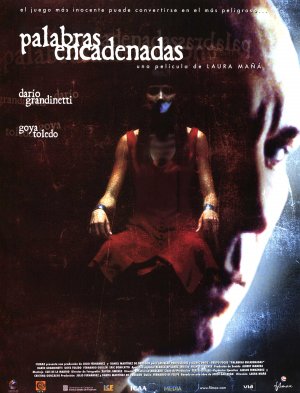
Do I know anything about Spanish psychological thrillers? Am I up on these things? Do I even know that ‘psychological thriller’ is usually a euphemism for highbrow horror? Let’s give me the benefit of the doubt here and assume that I can answer yes to ⅓ of those questions. (it’s the euphemism one) So, how did Killing Words (aka: Palabras Encadenadas) come across my desk? (and by ‘desk’, i mean ‘mailbox’. i don’t have a NoRealDanger desk, per se) That’s a good question actually. Near as I can figure, I found it on one of those “best horror by women” lists a long time ago, put it in my disc queue and then forgot about it. So, when it came, I thought, “Killing Words? What is this shit?” But I watched it anyway. Now, I know what is this shit. And, by simply reading on, you too can know what is this shit.
Ramon is an ordinary middle-aged guy. He teaches at a college. He is divorced. He enjoys recording his video journal periodically. At least that’s what he tells us (through his video journal), but it’s hard to believe when he’s also saying that he has killed people. In cold blood and without remorse. That may be the opposite of ordinary. And at the start of the film, he plays his diary / confessional for the woman that he has bound and gagged in his murder basement. What follows is an account of his interactions with the woman – mostly threats (words) and descriptions of planned violence (killing words?) with some actual violence peppered throughout – intercut with his interview with police detectives naming him as the main suspect in the woman’s disappearance.
Killing Words is a taut psychological thriller (to those of you playing review cliche bingo, you’re welcome) with a nasty bent. Ramon is a weasely weirdo with just enough social grace to convincingly slide under the radar as an “ordinary man”. His entitlement and immature desires with his captive speak volumes about his broken psyche and narcissistic worldview. He’s a sociopath with a child’s understanding of interpersonal relationships. This makes for an effectively tense and disorienting dynamic between him and his victim. And, director Laura Mañá wrings a lot of tension out of her story. This is a nightmare scenario for anyone, especially a woman. A man without empathy and a sense of entitlement to this woman’s body has her completely at his mercy. Her only hope of survival is to play his weird mind games that frustratingly fluctuate seemingly randomly between childish and dangerous. And simply playing along may be enough to push the unhinged creep over the edge. Despite all of this, Mañá takes a very unique approach to building sympathy and emotional investment in her characters. The obvious route would be to build sympathy for the victim. Sure, that sympathy is there, but in the simplest possible way – as a protective instinct for a fellow human in peril. Instead, she builds some (just a little) sympathy for Ramon by planting seeds of doubt about the extent of his guilt. This is done through his interview with the police. He admits to bringing the woman home, and even treating her roughly, but he never “really” harmed her and he certainly didn’t kill her. (oh, and he says that he’s never killed anyone) He even has a believable motive for his actions. I understand how bad that looks on paper – a kidnapper doesn’t hurt his victim too much, so we should sympathize. There’s no doubt that he is guilty of crimes and of violence against the woman, but maybe he’s not a complete monster. What this does, is expertly keep the audience guessing right up until the very end.
The Final Cut: Killing Words is an well-crafted psychological thriller that will keep audiences on their toes for the entire run-time.
